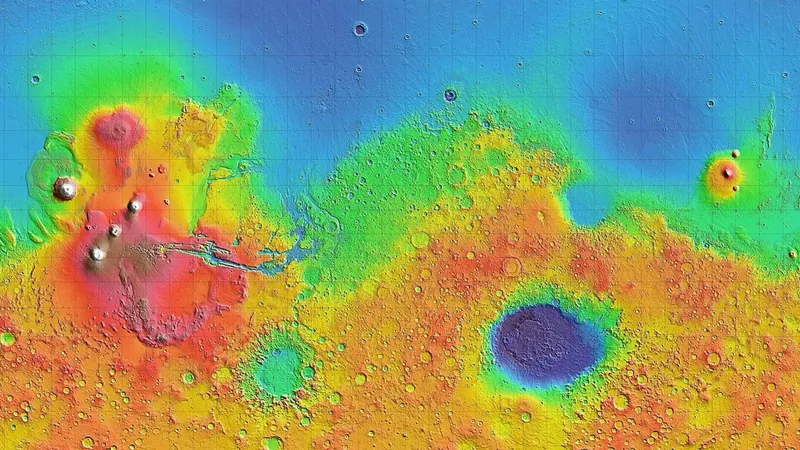
Groundbreaking NASA Research on Health and Performance in Spaceflight Makes Waves in 2025
2025-01-21
Author: Jia
NASA continues to push the boundaries of human health and performance in space, as evidenced by a recent compendium of research findings shared on January 17, 2025. This comprehensive overview highlights crucial studies funded by NASA that explore various aspects of space life science, with implications for future missions to Mars and beyond.
Among the highlighted studies, one significant piece authored by Puukila et al. addresses "Women’s Health in Spaceflight." Featured in the upcoming book "Precision Medicine for Long and Safe Permanence of Humans in Space," this chapter delves into the unique health challenges female astronauts may face during extended space missions. Given the increasing diversity in astronaut selection, ensuring optimal health for all crew members has never been more critical.
Unveiling the Complexities of Space Radiation
Another engaging study involves the use of a senolytic agent, ABT-263, which appears to mitigate the effects of radiation-induced gastrointestinal cancer in mice. Conducted by Kumar et al., this groundbreaking research reveals the potential for targeted therapies designed to protect astronauts from the harmful effects of low- and high-linear energy transfer (LET) radiation—an ever-present hazard in space travel. With a bustling journal impact factor of 5.955, this study underscores the urgent need for protective measures in future long-duration missions.
The Psychological Aspects of Spaceflight
Mental health in the extreme conditions of space is receiving heightened attention. Research led by Bell et al. examines the relationship between social support and stress within spaceflight analog environments, aimed at optimizing the psychosocial experiences of crew members. The pressures of isolation in a confined setting can be immense; thus, understanding these dynamics is essential for maintaining crew morale on missions lasting many months.
Teamwork and Performance Under Pressure
Additionally, research by Käosaar and Burke focuses on teamwork in isolated and extreme conditions. Their findings discuss how challenge characteristics directly affect teamwork and emotional states, offering insights that could improve crew dynamics during long-term missions away from Earth.
Spotlight on Plant Biology in Space
On the botanical front, a study by Kuang et al. reveals the fascinating possibilities of space-induced plant mutagenesis. Their work on "Deqin" alfalfa demonstrates how cosmic radiation may foster rapid growth—an important criterion for sustainable food production on space missions.
The ongoing challenge of understanding how various biological systems react to space conditions extends to all forms of life. For instance, the implications of chronic low-dose gamma radiation on plant growth, discussed by De Francesco et al., offer compelling evidence for advancing agricultural practices in space. Their work highlights the interaction between microgravity and radiation effects on crop production—key knowledge to ensure food security for future explorers.
The Future of Space Medicine
All these studies bring us closer to unearthing the complex realities of living and working in space. As NASA prepares for its ambitious missions to Mars, the necessity of addressing health, psychological resilience, and sustainable life support systems becomes paramount. The implications of these findings resonate beyond Earth—paving the way for the next generation of space exploration.
As humanity stands on the brink of interplanetary travel, these studies signify a turning point in space medicine and biology, reinforcing the idea that a well-prepared workforce, adept with proper support systems, is crucial for success in our endeavors beyond Earth. Could healthy astronauts be the key to extraterrestrial exploration? Only time will tell, but the scientific exploration of these vital questions has certainly begun.


 Brasil (PT)
Brasil (PT)
 Canada (EN)
Canada (EN)
 Chile (ES)
Chile (ES)
 Česko (CS)
Česko (CS)
 대한민국 (KO)
대한민국 (KO)
 España (ES)
España (ES)
 France (FR)
France (FR)
 Hong Kong (EN)
Hong Kong (EN)
 Italia (IT)
Italia (IT)
 日本 (JA)
日本 (JA)
 Magyarország (HU)
Magyarország (HU)
 Norge (NO)
Norge (NO)
 Polska (PL)
Polska (PL)
 Schweiz (DE)
Schweiz (DE)
 Singapore (EN)
Singapore (EN)
 Sverige (SV)
Sverige (SV)
 Suomi (FI)
Suomi (FI)
 Türkiye (TR)
Türkiye (TR)